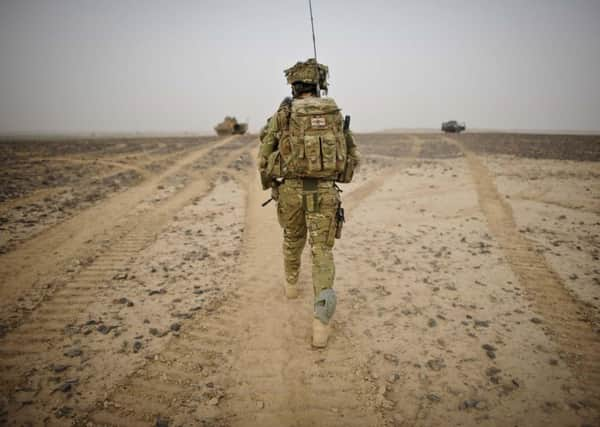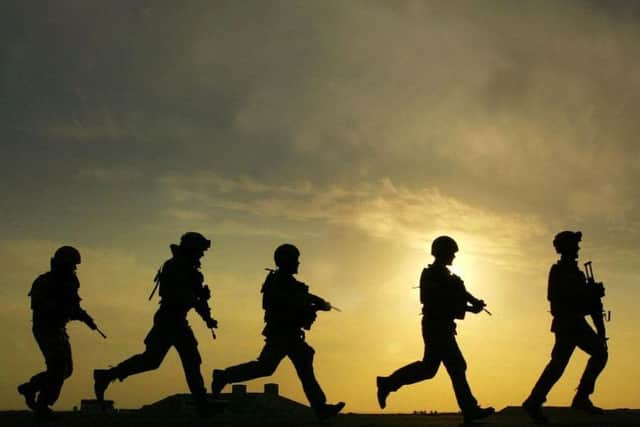Yorkshire veteran speaks of his journey to seek help after trauma in Afghanistan


It was Christmas Eve 2007 when Dan watched his Royal Marines comrade step on a bomb. “The IED blew both his legs and arms off,” he recalls.
Dan, who has requested only his first name is used, joined the service in 2006. He was two months into his first tour in Afghanistan, on only his second patrol when he witnessed the harrowing blast, which caused him to lose some of his hearing. A man behind him was struck in his shoulder by shrapnel “the size of a mug”.


Advertisement
Hide AdAdvertisement
Hide Ad“You don’t react as you think you’re going to in those situations. There’s fear, there’s all sorts going through your mind. I froze. You think you’re going to be a hero, and you are just as scared as anybody else. If you move, you could step on a bomb as well.”
More than a decade has passed since what Dan’s partner Natalie calls “the traumatic incident” but its effects are lasting. “I could tell straight away that things weren’t okay with him,” she says, looking back to when they met in summer 2011. At the time, Dan, who previously worked as a builder, was on rest and recuperation in the UK, part way through his second tour in Afghanistan. “He couldn’t stand any repetitive noises like a ticking clock. A baby crying, he would have to leave the room. It would send him into massive anxiety and angry kind of feelings.”
The years that have followed have seen “peaks and troughs” of feeling fine and not for Dan, who was deployed for a third tour in 2014 before leaving the forces on his return later that year. In his low points, he has not wanted to go out, interact or socialise and has struggled to cope with day-to-day stresses.
“Any stressful event would trigger a massive downward spiral of depression and anxiety, and not wanting to leave the house,” Natalie says. “He kind of refused to believe for a long, long time that there was anything wrong.”
Advertisement
Hide AdAdvertisement
Hide Ad“For at least a couple of years after my first tour, I would say I was wired,” says Dan, who now runs a construction company. “I didn’t really sleep very well but like anything, you don’t really see it as a problem. I learnt to forget about it, but now I am a civvy, sometimes life stresses bring up bad memories you have never had chance to deal with.”
Natalie, 36, has encouraged Dan to get support for years, but “I felt I should be able to deal with stuff” he says. “I’m from Yorkshire, we are tough. I’ve worked in the building trade, been in the marines, I class myself as a tough bloke and it is hard to ask for help or acknowledge you have a problem. It is hard to accept you aren’t 100 per cent.”
Dan, 32, found himself “in a rut” after Christmas this year and was pressed again by Natalie, worried about him and the impact his “depressed state” was having on their two daughters, to ask for help by contacting veterans’ mental health charity Combat Stress.
In June, having felt like taking his own life, Dan, who lives in Dishforth, North Yorkshire says he made the phonecall. He claims he was told he would be called back, but it could take two to four weeks due to staff absence. After a month went by, a frustrated Natalie called the charity herself, explaining that her partner really needed help and asking for advice about where else they could turn.
Advertisement
Hide AdAdvertisement
Hide AdDan says he then received a call from a mental health nurse, who carried out a triage assessment over the phone. “It was about a month after that, then a letter came through saying yes we’ve agreed that you do need help and that Dan would be contacted in due course,” Natalie says. “All that time (about eight weeks) had elapsed and they still hadn’t given any help.”
Between the time of the triage, and the letter’s arrival, Dan suffered a mental health breakdown. “He went missing for a period of time. He walked out of work. I think if we hadn’t been here that he would have gone and hung himself...If he hadn’t had a family, it would have been entirely different.”
Desperate, Natalie then contacted their GP and secured private treatment for her partner. “It’s not an overnight thing but I would say I am getting there,” says Dan, who has now been diagnosed with Post Traumatic Stress Disorder (PTSD).
He says Combat Stress did get in touch again to arrange help but he was already being seen privately at York Stress and Trauma Clinic. “When people ask for help, they need it now,” he says. “When you get into that state of mind, it just gets worse and worse.”
Advertisement
Hide AdAdvertisement
Hide AdCombat Stress has told The Yorkshire Post that earlier this year, veterans faced an “unprecedented” five week wait to be assessed as it struggled to recruit triage nurses. It comes at a time of increasing demand for the charity, which was founded shortly after the First World War.
In the past decade, the number of veterans seeking its help has increased by 97 per cent and more than 2,000 new veterans now turn to it each year. Almost 80 per cent of those it treats have PTSD, though it says its residential treatment programme for veterans with the disorder is now at risk of being cut after it lost £3.2m of annual funding for the scheme from NHS England earlier this year.
Last year, Combat Stress’ helpline handled more than 12,000 calls, 24 per cent more than in 2016. In the past six months, the charity says it received an average of 50 per day. Its six call handlers establish whether a veteran needs to be assessed for mental health treatment, according to a spokesperson for the charity. If so, the veteran will be referred for an assessment with one of five triage nurses over the phone - and it aims to do this within 48 hours.
Those suitable for the charity’s services will then be referred to their nearest Combat Stress mental health team.“Earlier this year we had some difficulties recruiting triage nurses,” the spokesperson says. “It meant there was an unprecedented waiting time of five weeks for triage assessments. The team is now fully staffed and we are back to the 48 hour timeframe of triaging veterans.”
Advertisement
Hide AdAdvertisement
Hide AdThe charity, which in a letter received by Dan said it provides “routine, planned care only and cannot respond or support crisis or urgent care requests”, maintains it can cope with the volume of calls.
If it is not able to answer, the person ringing will be directed to leave a voicemail and called back, it says. “Our aim is that each month, no more than 10 per cent of callers to the helpline hang up.” If the abandonment rate was “repeatedly being exceeded”, the charity would consider increasing the number of call handlers.
“I don’t want to discourage other people from calling Combat Stress, because they’ve helped a lot of people,” Natalie says.
She and Dan would like to see a published information list setting out the names and contact details of all services, private specialists and charities that veterans and serving members of the forces can turn to, what help they can offer - for example with mental health or finances - and the process for accessing it, and any waiting times. “There doesn’t seem to be many publicly known other options of what to do.”
Advertisement
Hide AdAdvertisement
Hide AdEarlier this year the Johnston Press investigations team found that no comprehensive official records were kept of the number of British ex-servicemen and women taking their lives. The Ministry of Defence launched a new study last month into deaths, including suicide rates, of personnel who were deployed to conflicts in Iraq and Afghanistan. It came as an investigation by The Sunday Times which found that 42 former or current service men or women are believed to have committed suicide since January.
*Helplines: Samaritans - 116 123, Combat Stress for veterans and families - 0800 138 1619, Military Mental Health Helpline for serving personnel and families - 0800 323 4444, Veterans Gateway - 0800 138 1619
